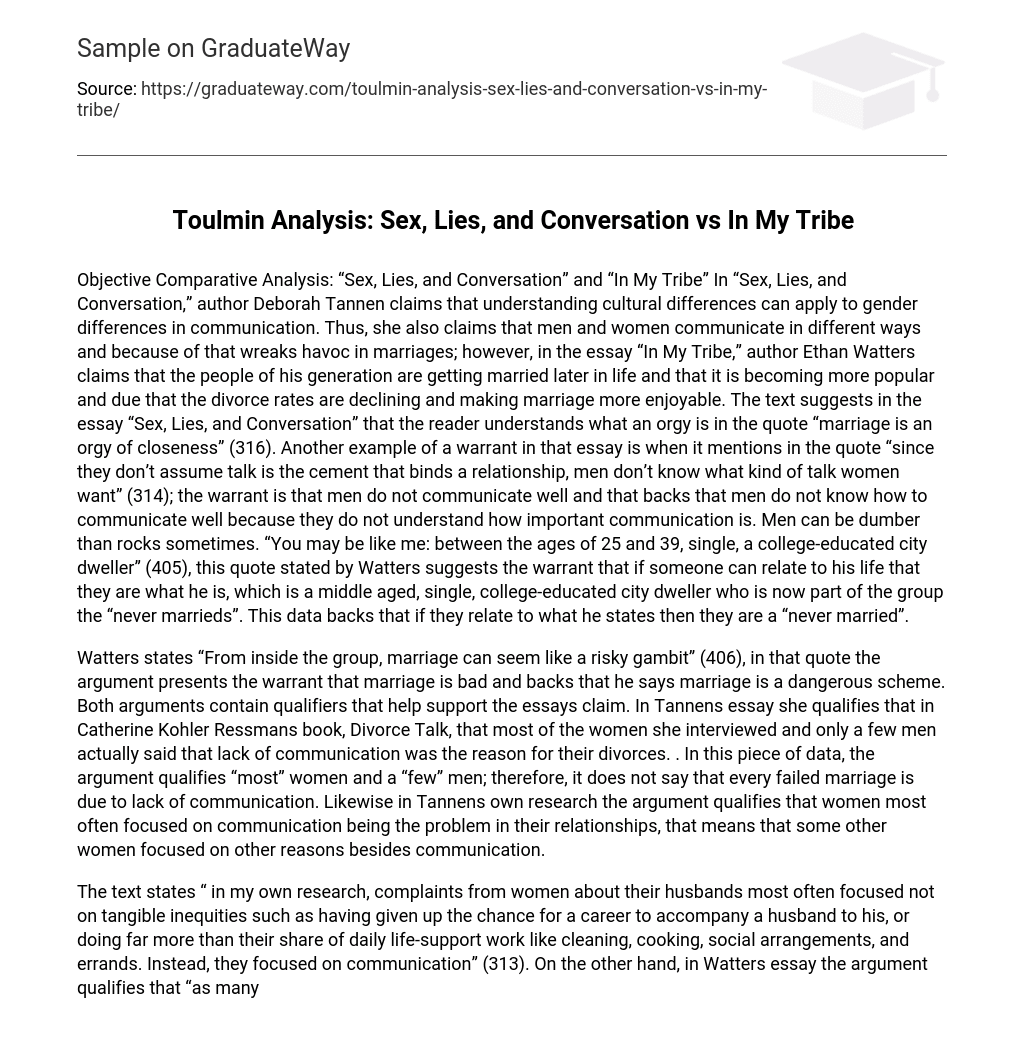Objective Comparative Analysis: “Sex, Lies, and Conversation” and “In My Tribe” In “Sex, Lies, and Conversation,” author Deborah Tannen claims that understanding cultural differences can apply to gender differences in communication. Thus, she also claims that men and women communicate in different ways and because of that wreaks havoc in marriages; however, in the essay “In My Tribe,” author Ethan Watters claims that the people of his generation are getting married later in life and that it is becoming more popular and due that the divorce rates are declining and making marriage more enjoyable. The text suggests in the essay “Sex, Lies, and Conversation” that the reader understands what an orgy is in the quote “marriage is an orgy of closeness” (316). Another example of a warrant in that essay is when it mentions in the quote “since they don’t assume talk is the cement that binds a relationship, men don’t know what kind of talk women want” (314); the warrant is that men do not communicate well and that backs that men do not know how to communicate well because they do not understand how important communication is. Men can be dumber than rocks sometimes. “You may be like me: between the ages of 25 and 39, single, a college-educated city dweller” (405), this quote stated by Watters suggests the warrant that if someone can relate to his life that they are what he is, which is a middle aged, single, college-educated city dweller who is now part of the group the “never marrieds”. This data backs that if they relate to what he states then they are a “never married”.
Watters states “From inside the group, marriage can seem like a risky gambit” (406), in that quote the argument presents the warrant that marriage is bad and backs that he says marriage is a dangerous scheme. Both arguments contain qualifiers that help support the essays claim. In Tannens essay she qualifies that in Catherine Kohler Ressmans book, Divorce Talk, that most of the women she interviewed and only a few men actually said that lack of communication was the reason for their divorces. . In this piece of data, the argument qualifies “most” women and a “few” men; therefore, it does not say that every failed marriage is due to lack of communication. Likewise in Tannens own research the argument qualifies that women most often focused on communication being the problem in their relationships, that means that some other women focused on other reasons besides communication.
The text states “ in my own research, complaints from women about their husbands most often focused not on tangible inequities such as having given up the chance for a career to accompany a husband to his, or doing far more than their share of daily life-support work like cleaning, cooking, social arrangements, and errands. Instead, they focused on communication” (313). On the other hand, in Watters essay the argument qualifies that “as many ex-girlfriends will ruefully tell you, loyalty to the tribe can wreak havoc on romantic relationships” (406). The qualifier in that example is “many of” and it qualifies that most of the ex-girlfriends, but not all, blame the failed relationship on the tribe. Watters argument also qualifies “an article in Time magazine asked whether “picky” women were “denying themselves and society the benefits of marriage” (405). The text qualifies “picky” and “women” and those are qualifiers because it is specific to women and describes only picky women, not all women. Another example of a specific qualifier is when Watters talks about the perfect soul mate and he mentions “fully three out of four college women said they’d marry a man they didn’t love if he fits their criteria in every other way” (406). The specific qualifiers shown in that quote were “three out of four”, “college”, and “women”: they are specific because it states a certain number, a certain age group, and a certain gender.
Several rebuttals are present in Watters essay. One is that the argument rebuts the census bureau statement of “never married” by explaining how that group does get married, however they get married later in life. Waters rebuts Time magazine that due to the tribe, family values are not lost but reinvented; therefore, family values are not lost. Tannens argument contains only one rebuttal in her essay and that is “some couples will still decide to divorce”: here she counteracts her whole argument by stating that after all the trying to save the marriage, it ends in divorce.
Works Cited
Tannen, Deborah. “Sex, Lies, and Conversation.” Subjects/Strategies: A Writers Read. Ed. Denise B. Wydra and Nancy Perry: Boston 2005. 312-317. Print. Watters, Ethan. “In My Tribe.” Subjects/Strategies: A Writers Read. Ed. Denise B. Wydra and Nancy Perry: Boston 2005. 405-407. Print.





